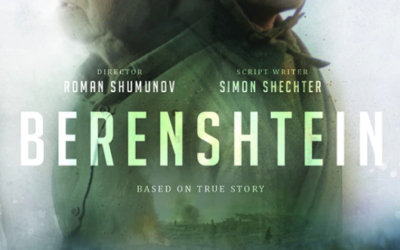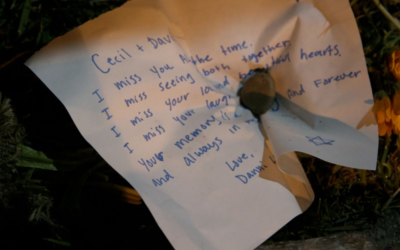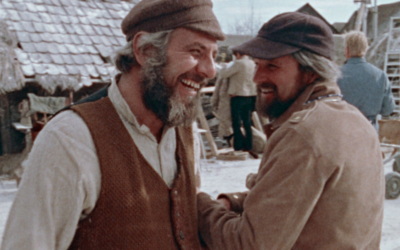Bernstein & Bahr’s Best Bets for AJFF 2022
The 2022 AJFF features 55 films from 18 countries. Bob Bahr and Matthew Bernstein, a professor of film at Emory University, provide a list of the top offerings you can’t miss.
The 2022 Atlanta Jewish Film Festival features an array of 55 films from 18 countries, all of which are available for screening during the festival’s entire 12-day run. Most can be accessed online from anywhere in Georgia, but several — like “The Specials,” which is one of Bernstein and Bahr’s Best Bets — can be screened by anyone with an internet connection anywhere in the United States. Here is our top selection of offerings that combine strong, artistic statements with compelling subject matter.
Berenshtein
“Berenshtein” is an Israeli docudrama that honors the life of Leonid Berenshtein, the last surviving commander of a battalion of Russian WWII partisans. It’s a thrilling film that time and again makes you want to cheer for the young, dashing, brilliant and often brutal Jewish hero, played by Ukrainian actor Yaroslav Kucherenko.

The film also gives the lie to the mistaken notion that Jews were led willingly to their slaughter, without ever fighting back, during the Holocaust.
In this tale of a genuine Jewish hero who never strays far from his principles or his shrewd judgment, you are likely to find immense satisfaction in knowing that he is truly one of us.
The Specials
“The Specials” is a remarkable film that treats the experiences, challenges and triumphs of autistic people and those who care for them with care and compassion.
Through an overarching narrative and several subplots, the film follows the partnership between an Orthodox Jew and a Muslim who prepare the “specials” for work. From the opening scene there is never a dull moment and the action and editing are fast-paced.
As we saw at last year’s AJFF, with the Israeli film, “Here We Are,” realistic productions about autistic people can be painful yet uplifting. That is overwhelmingly the case with “The Specials,” which takes viewers into a challenging world that might seem marginal and makes it normal.
Tree of Life
As Shabbat services were getting underway on October 27, 2018, at ten minutes to 10:00, a 46-year-old white supremacist named Robert Gregory Powers entered the Tree of Life synagogue in Pittsburgh, Penn. He was carrying four semi-automatic weapons, including an AR-15 assault rifle. In a little over an hour, 11 of those who had come for the morning minyan were dead, and seven others were wounded, including four police officers.

“Tree of Life” is the first film about this deadly shooting and its aftermath. This expertly produced film, which has its Atlanta premiere at the festival, features extensive interviews and the personal stories of those who survived, as well as with family members of three of those who did not. It brings sensitivity and restraint to its telling of the story and the questions it raises about the real impact of the ideas that proliferate in this political climate.
The film is a chilling reminder that extreme political rhetoric may, in fact, encourage those in our midst who are emotionally unhinged — and armed to the teeth — to act out their murderous fantasies on our community.
Image of Victory
“Image of Victory” is one of the absolute top films at the festival this year. It’s about the little-known battle for Nitzanim during Israel’s War of Independence in 1948, which took place in southern Israel, on the coast between Gaza and the city of Ashdod. Well-equipped units of the Egyptian army faced off against the vastly outnumbered and ill-equipped defenders of the kibbutz. The film dramatizes Israel’s existential struggle to exist from the very moment of its founding.
Recreating the battle in extraordinary detail, “Image of Victory” gives this story the epic treatment it deserves. Avi Nesher, who wrote the script and directed what may be the best film of his long career, is capacious enough to create vivid characters, even in secondary roles.
The result is simultaneously suspenseful, hopeful, funny and heartbreaking. Viewers will emerge more skeptical of established narratives and what governments tell us about their military exploits.
Fiddler’s Journey to The Big Screen
2021 marked the 50th anniversary of the film version of “Fiddler on the Roof.” For all of us who love this great movie, the festival has a special anniversary present. The documentary “Fiddler’s Journey to the Big Screen” relates, in its own charming and very through way, everything you ever wanted to know about how the film version came to be.

Released in 1971, “Fiddler” was the top grossing American film of the year. In the documentary, the viewer is treated to behind-the-scenes footage shot during the production as well as many of the most familiar scenes from the finished film. It also introduces the main creative figures involved in the blockbuster 1971 production.
Holding everything together is producer and director Norman Jewison, who, at 95, is bursting with energy and charm. Not to be discounted is Topol, who at 85 has lost none of his skill in front of the camera. “Fiddler’s Journey to the Big Screen” is the perfect companion to the groundbreaking film.
Let it Be Morning
“Let it Be Morning,” based on the novel of the same name by Palestinian Israeli writer Sayed Kashua, is Israel’s submission to the Academy Awards.
Kashua specializes in detailing the impossible and improbable positions — social, political, cultural, familial — that Palestinian Israelis find themselves in. He calls this “forced exile in the heart of my homeland.” In the film, the main exile is Sami, a successful Palestinian Israeli who has been working as a coding executive for a high-tech company in Jerusalem. As the film opens, Sami and his family are attending his younger brother’s wedding in his home village when an Israeli lockdown forces them to remain there indefinitely. Over several days, Sami learns more about the village and the various conflicts that have divided the town. While the IDF and the Israeli government control their every move, the villagers have, in turn, internalized the restrictions they live under.
The film’s mix of absurdity and melancholy — of motion and stillness — requires a delicate balance, but “Let it Be Morning” does it beautifully, thanks to the direction and the cast.
More information is available at www.ajff.org.
The complete one hour video of the Best Bets presentation is available at https://tinyurl.com/mrydj7c2.
- News
- Local
- Atlanta Jewish Film Festival
- Best Bets
- Leonid Berenshtein
- World War II
- holocaust
- Tree of Life
- Robert Gregory Powers
- War of Independence
- Fiddler on the Roof
- Norman Jewison
- Palestine
- Israel
- Bob Bahr
- Berenshtein
- The Specials
- Image of Victory
- Fiddler’s Journey to The Big Screen
- Let it Be Morning




comments